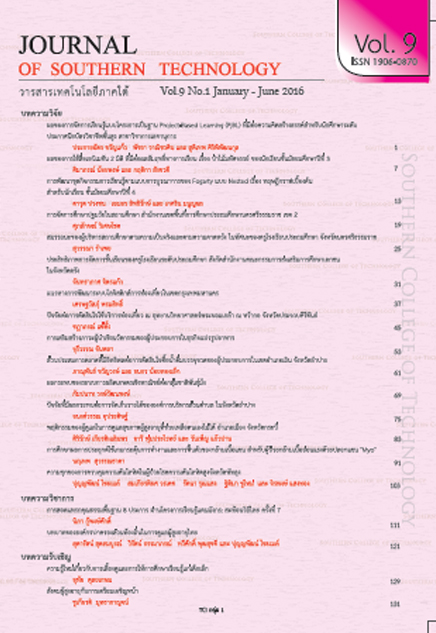การเสริมสร้างภาวะผู้นำเชิงนวัตกรรมของผู้ประกอบการ ในธุรกิจแปรรูปอาหาร
Main Article Content
บทคัดย่อ
งานวิจัยนี้มีวัตถุประสงค์เพื่อ (1) ศึกษาองค์ประกอบภาวะผู้นำเชิงนวัตกรรมของผู้ประกอบการในธุรกิจแปรรูปอาหาร และ (2) สร้างคู่มือการพัฒนาภาวะผู้นำเชิงนวัตกรรมของผู้ประกอบการในธุรกิจแปรรูปอาหาร ประชากรและกลุ่มตัวอย่างได้แก่ ผู้เชี่ยวชาญ ผู้ทรงคุณวุฒิ และผู้ประกอบการในธุรกิจแปรรูปอาหาร เครื่องมือที่ใช้ได้แก่ แบบสัมภาษณ์เชิงลึกแบบกึ่งโครงสร้าง แบบสอบถาม แบบทดสอบก่อนการฝึกอบรมและหลังการฝึกอบรม และแบบประเมินความพึงพอใจของผู้เข้ารับการฝึกอบรม วิธีการวิเคราะห์ข้อมูลได้แก่ การวิเคราะห์เชิงเนื้อหา การวิเคราะห์ ค่าความถี่ ค่าร้อยละ ค่าเฉลี่ย ค่าเบี่ยงเบนมาตรฐาน การทดสอบค่าที การวิเคราะห์ดัชนีประสิทธิผล และการวิเคราะห์องค์ประกอบเชิงสำรวจ
ผลการวิจัยพบว่า องค์ประกอบภาวะผู้นำเชิงนวัตกรรมของผู้ประกอบการในธุรกิจแปรรูปอาหารมี 6 องค์ประกอบได้แก่ (1) การกำหนดทิศทางและกลยุทธ์ที่มุ่งสู่นวัตกรรม (2) การสร้างบรรยากาศและวัฒนธรรมที่เอื้อต่อการเรียนรู้ (3) การสร้างเครือข่ายและการจัดการความรู้ (4) การกำหนดโครงสร้างการทำงานแบบทีม (5) การสนับสนุนและสร้างแรงจูงใจในเป้าหมายด้านนวัตกรรม และ (6) การพัฒนาทักษะการคิดเชิงนวัตกรรม โดยค่าความแปรปรวนสะสมของทั้ง 6 องค์ประกอบเท่ากับร้อยละ 61.273 ผลการสร้างคู่มือการพัฒนาภาวะผู้นำเชิงนวัตกรรมของผู้ประกอบการในธุรกิจแปรรูปอาหาร ประกอบด้วย 5 หมวด ได้แก่ (1) นวัตกรรมและการพัฒนานวัตกรรม (2) การสร้างเครือข่ายและบรรยากาศองค์การแห่งการเรียนรู้ (3) การจัดการเชิงกลยุทธ์สำหรับผู้นำเชิงนวัตกรรม (4) การทำงานเป็นทีม การสร้างแรงจูงใจ และการสื่อสาร และ (5) การพัฒนาทักษะการคิดเชิงนวัตกรรม องค์ประกอบทั้ง 6 ของภาวะผู้นำเชิงนวัตกรรมและคู่มือการพัฒนาภาวะผู้นำเชิงนวัตกรรมของผู้ประกอบการในธุรกิจแปรรูปอาหารได้รับความเห็นชอบจากผู้เชี่ยวชาญด้วยมติเอกฉันท์ ผลการนำคู่มือการพัฒนาภาวะผู้นำเชิงนวัตกรรมของผู้ประกอบการในธุรกิจแปรรูปอาหาร หมวดที่ 4 การทำงานเป็นทีม การสร้างแรงจูงใจ และการสื่อสาร หน่วยการเรียนรู้ที่ 1 การทำงานเป็นทีมและการลดความขัดแย้งในทีมไปใช้ พบว่าดัชนีประสิทธิผลมีค่าเท่ากับ .57 และมีค่าความพึงพอใจในการฝึกอบรมอยู่ในระดับมาก
Enhancement of Innovative Leadership of Entrepreneurs in Processed Food Business
The purposes of this research were to (1) study factors of innovative leadership of entrepreneurs in processed food business, and (2) develop a manual to enhance innovative leadership of entrepreneurs in processed food business. Participants were experts, educators and entrepreneurs who involved in processed food business. The research tools were semi-structured interview, questionnaire, pre and post test, and evaluation forms. Data were analyzed by content analysis, descriptive and inferential statistics, including frequency distribution, percentage, mean, standard deviation, t–test, effectiveness index and exploratory factor analysis.
The findings revealed that the factors of innovative leadership of entrepreneurs in processed food business comprise six factors: (1) outlining vision and strategies towards innovation, (2) establishing atmosphere and culture toward learning, (3) creating network and knowledge management, (4) setting teamwork structure, (5) providing supports and incentives for innovative goals, and (6) developing innovative thinking skills. Specifically, the cumulative variance of the six factors was at 61.273 percent and the manual to enhance innovative leadership of entrepreneurs in processed food business could be divided into five modules: (1) innovation and innovative development process (2) creating a network of innovation and learning organization (3) strategic management for innovative leadership (4) team building, motivation and communication and (5) development of innovative thinking skills. The findings with regard to the six factors of innovative leadership of entrepreneurs in processed food business and a manual to enhance innovative leadership of entrepreneurs in processed food business reached a general consensus as approved by the experts. The try out using unit 1: teamwork and conflict reducing of module 4: team building, motivation and communication revealed that its effectiveness index was at .57 and a high level of satisfaction of the training was also observed.
Article Details
- ผู้เขียนต้องยินยอมปฏิบัติตามเงื่อนไขที่กองบรรณาธิการวารสารกำหนด และผู้เขียนต้องยินยอมให้บรรณาธิการ แก้ไขความสมบูรณ์ของบทความได้ในขั้นตอนสุดท้ายก่อนเผยแพร่
- ลิขสิทธิ์บทความเป็นของผู้เขียน แต่วารสารเทคโนโลยีภาคใต้คงไว้ซึ่งสิทธิ์ในการตีพิมพ์ครั้งแรก โดยเหตุที่บทความนี้ปรากฏในวารสารที่เข้าถึงได้จึงอนุญาตให้นำบทความไปใช้เพื่อประโยชน์ทางการศึกษา แต่มิใช่เพื่อการพาณิชย์

